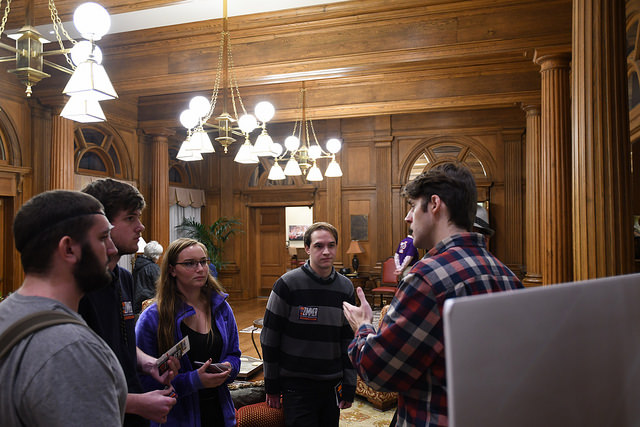CPP holds forum for sixth district candidates
Sixth District representative candidates Peter Zimmer, the Democratic nominee, Brad Roae, the incumbent Republican nominee, and Lester Lenhart, a write-in candidate, stayed after the forum to speak with audience members on Tuesday, Nov. 1, 2016.
Three candidates vying to represent the 6th Pennsylvania House of Representatives District—encompassing Crawford County and parts of Erie County—met to debate on Tuesday, Nov. 1, in the Tippie Alumni Center.
Brad Roae, the incumbent Republican representative, Democrat Peter Zimmer and write-in candidate Lester Lenhart spoke at the event, hosted by Allegheny College’s Center for Political Participation. The candidates were asked to prepare remarks about jobs, education and public health in the district.
Each candidate had five minutes to give prepared remarks, followed by three minutes to respond to their opponents’ assertions.
I think the key to job creation is lowering our taxes.
— Brad Roae
At the conclusion of the debate there was a 30 minute period for audience members to pose their own questions to the candidates. Each audience question was passed on index cards to the CPP fellows walking around the room. The fellows collected the cards throughout the forum so that audience questions arising throughout the debate could be submitted to the moderators.
An underlying theme of each candidate’s answers was what the role of government is within society. Roae said the role of government is to remove itself from the daily lives of people and business operations.
“Government cannot create jobs,” Roae said. “All government can do is stay out of the way so that business owners can create jobs.”
Roae also decried the Patient Protection and Affordable Care Act, commonly known as “Obamacare.” He said it demonstrates the federal government interfering between a buyer and a seller, which he said is not an enumerated power of Congress.
Zimmer said he “fundamentally” rejects Roae’s notion of an uninvolved government.
“The idea that government is there just to stay out of the way is such a simplistic and reductive idea that I think is damaging to our region,” Zimmer said.
After the debate, Zimmer said his platform is governmental action.
“I think my message resonates not with a party, but with people who want action,” Zimmer said.
Lenhart, who ran against Roae in the Republican primary, said an issue with the current Pennsylvania government is the amount of taxation and regulation it places on businesses.
Throughout the debate, Roae, who is running for his sixth two-year term in the Pennsylvania House, also challenged the current business tax rate.
“I think the key to job creation is lowering our taxes,” Roae said.
While specifically targeting business tax rates, Lenhart said he plans to update the state tax code to meet current issues.
“The tax system within the state of Pennsylvania needs to be reformed,” Lenhart said. “Each and every part of it.”
Lenhart said one necessary change for the tax code is the way school districts are funded. Property taxes, according to Lenhart, are a major source of funding for Pennsylvania schools. He said the system of funding schools with property taxes creates inequity, as poorer communities tend to get less funding through property taxes. Zimmer agreed.
“It’s unfair, it’s inequitable and it’s a broken system,” Zimmer said after the debate.
Both Lenhart and Zimmer agreed that altering the tax code is an integral part of promoting education in the state. Roae said Pennsylvania schools outspend the national average and that other steps must be taken to improve education.
Roae said the state spends more money on education per student than the average U.S. state and that no school in Pennsylvania spends less per student than the national average. He suggested merit pay for teachers and banning teacher strikes as ways to improve education.
When asked to address the issue of public health, Roae attacked the federal Patient Protection and Affordable Care Act and suggested repealing the law, over which the state legislature has no purview.
Lenhart suggested state representatives work closely with congressmen to improve national healthcare policies, and Zimmer suggested that the state take steps to lower the cost of healthcare across the board.
After the debate, Lenhart attacked the number of terms Roae has served. Lenhart said he supports placing a limit of two terms on representatives, and he would place such a limit on himself were he elected.
“I will be a person who will burn the candle at both ends,” Lenhart said.
Roae disagreed, saying the length of his tenure in the Pennsylvania assembly has benefited the region.
“Not only can I hit the ground running, I’ve already been running,” Roae said. “You have to have a good network of people in Harrisburg to get things done.”
Both Roae and Zimmer will be on the ballot for the Pennsylvania House, while Lenhart is running a write-in campaign. Election Day is Tuesday, Nov. 8.









